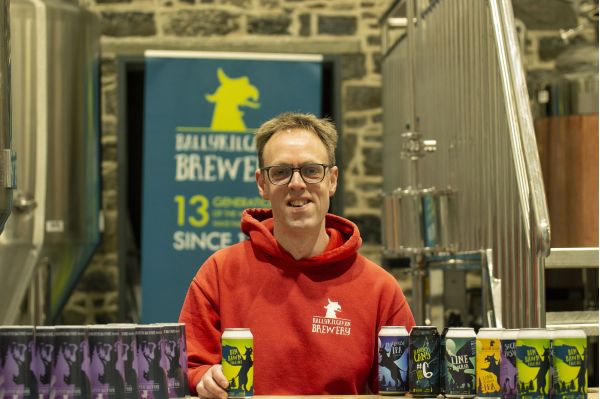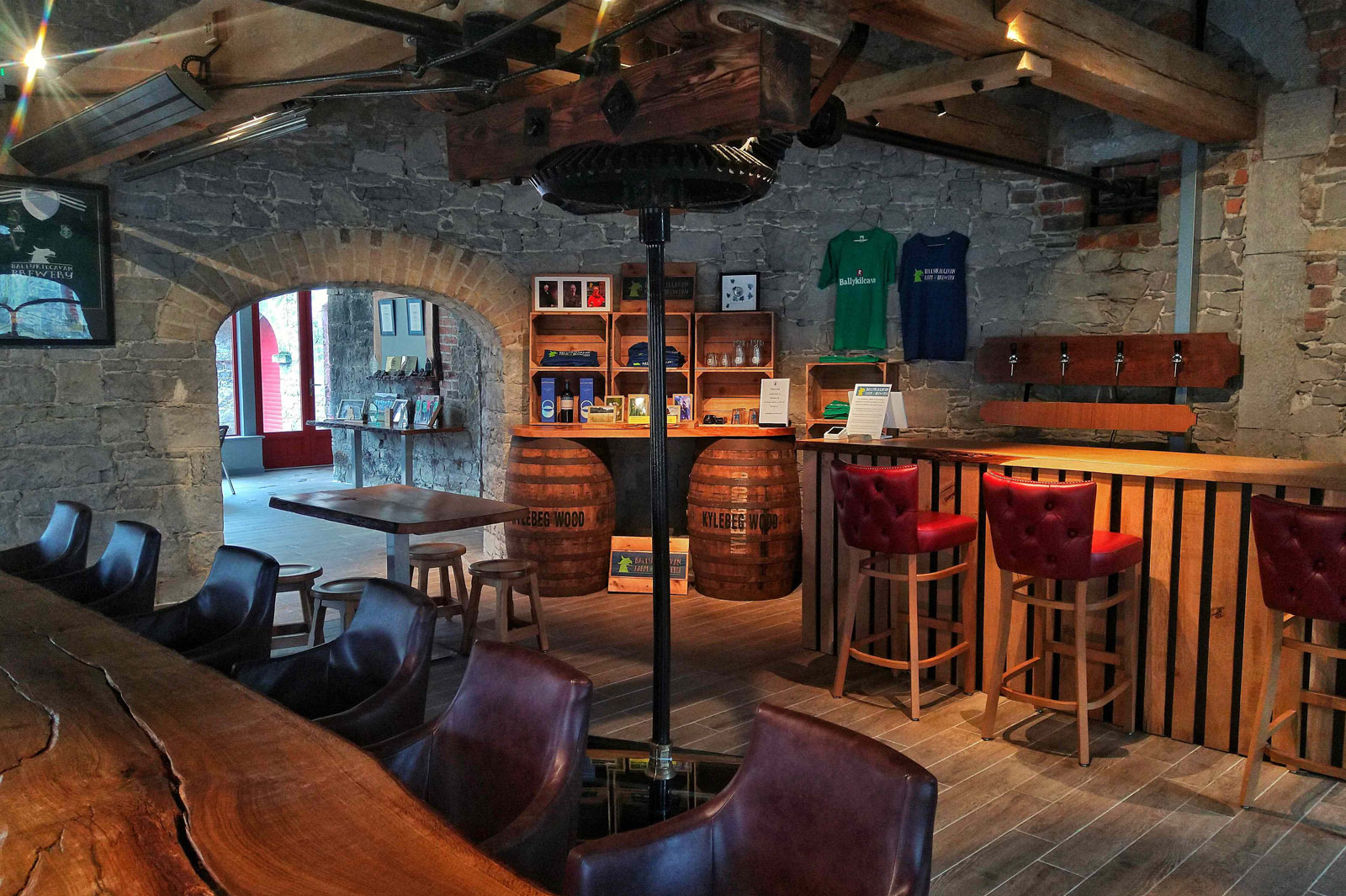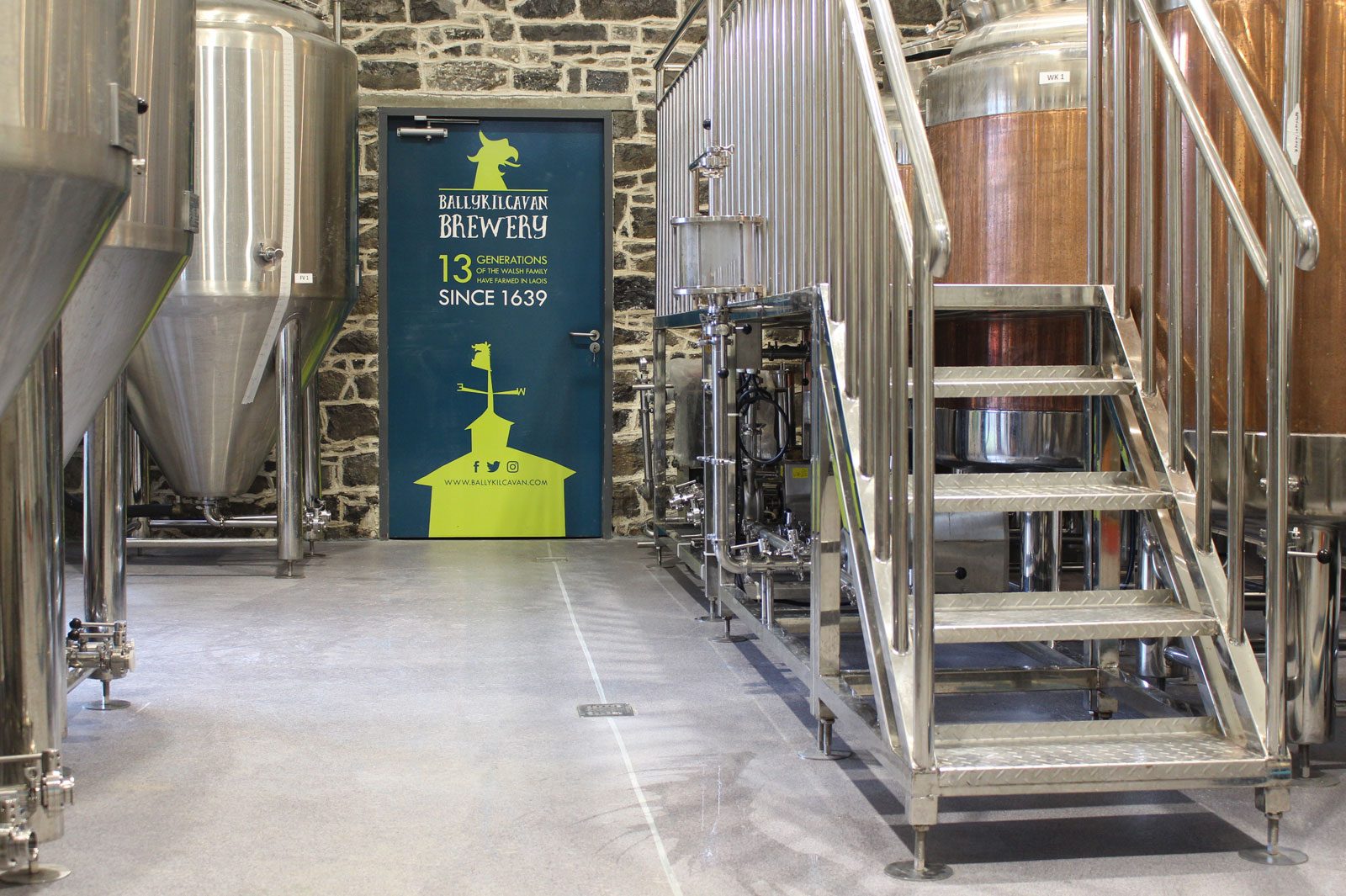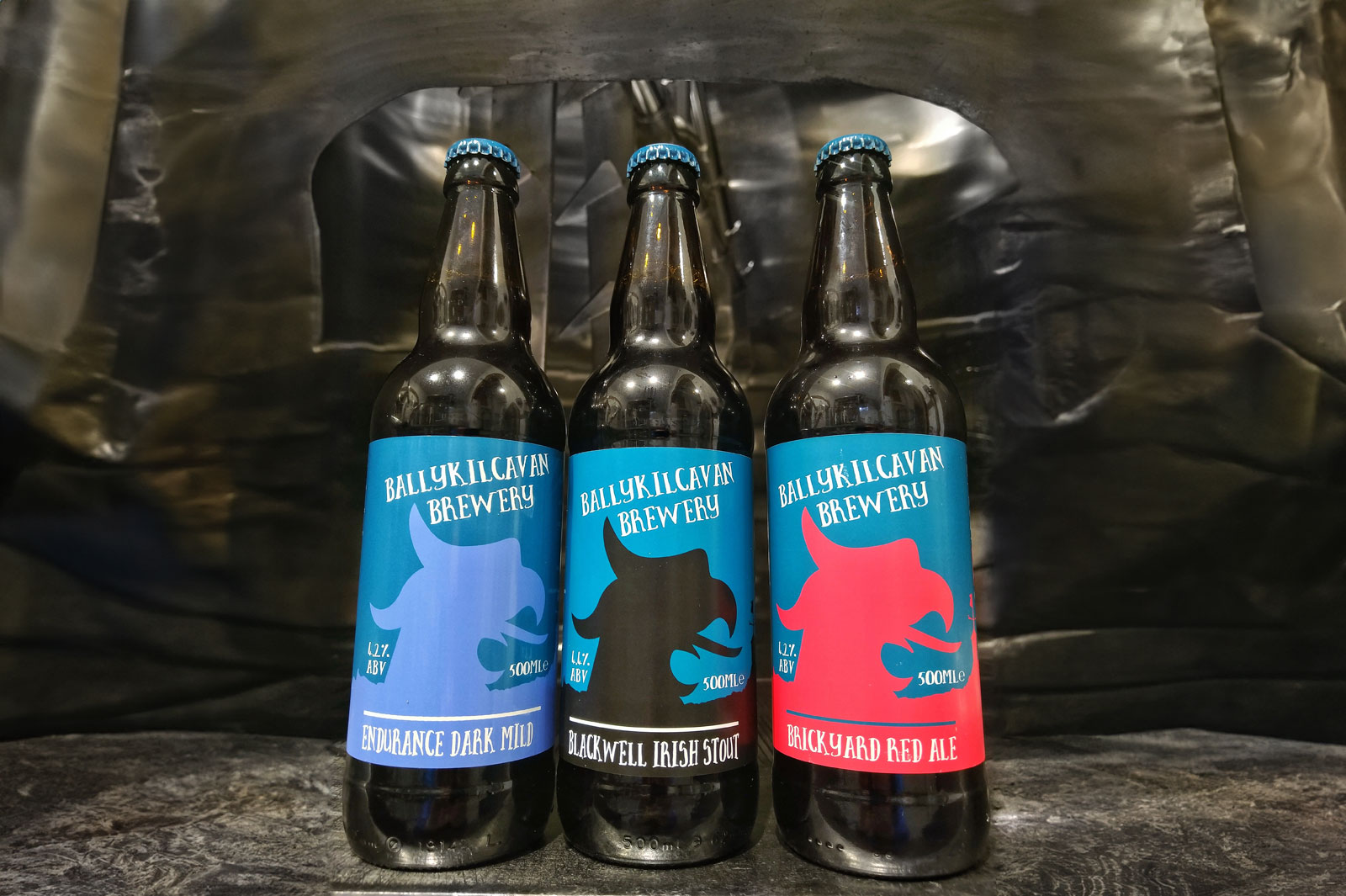Raising the bar at Ballykilcavan

Maintaining and retaining a family farm for 13 generations in Ireland is no easy feat and Ballykilcavan Farm’s evolution over several hundreds of years would have, no doubt, been the result of some ambitious and brave decisions. For David, that took the form of diversification.
“When I took over the farm, in 2004, I farmed it pretty conventionally,” he says. “It was a mixed farm mainly; about half was in forestry and the rest of it was a combination of tillage and sucklers. Sucklers, as far as I could see, made absolutely no money whatsoever and were a lot of work, particularly over the winter, so they went pretty much as soon as I came in.
“So then we were back to just forestry and tillage. After about 12 years I started looking at the finances and worked out that, if you took the Single Farm Payment out of it, the actual farm had made something like €300 profit in total in that time!”
While brave, diversification was also ‘absolutely necessary’ to help keep the farm alive, says David. The nature of the farming enterprise – they had the barley, and they had their own well, divined in the 18th century – pointed David in a certain direction. Then, there were all the impressive stone out-houses. While very beautiful, they were built for ponies and carts rather than tractors and trailers. So, another challenge was to find a use for them. A distillery and a brewery made the shortlist of options and a few ‘quick sums’ confirmed the winner. “I came up with a figure of €5m in terms of how much cash we would need to get a distillery up and running. We had nothing near that, so we would have been looking at outside investment. But me and my wife, Lisa, wanted to run this place as a family business, as the only directors.” And so, Ballykilcavan Farm and Brewery was born.
Soil and beer
They say ignorance is bliss and David would attest to this when embarking on the brewing journey about eight years ago: “If I knew then what I know now...,” he says, laughing. “It was definitely a combination of naivete and enthusiasm that encouraged me,” he said. Like all farmers, he wanted to leave Ballykilcavan in better position than he received it should any of his three children want to get involved when they are older. Doing things a bit unconventionally was the only way he saw fit to make that happen.
Adding the brewery to the farming enterprise has been challenging but being the primary producer of the brewery’s barley has its advantages and David’s farming and tillage knowledge is invaluable. He may now be a 'beer farmer', but he is a soil farmer first and foremost.

The tasting room and visitor centre in the old mill house.
Barley batches
Two batches of barley are grown at Ballykilcavan farm: one is for Waterford Distillery, which it uses to make whiskey; and the other batch is for brewing Ballykilcavan’s beer. “I grow 110 tonnes of barley and I sell that to Minch Malt in Athy. They convert it to malt and then the brewing company (Ballykilcavan) buys back what we think we will use for the year. That is me as the director of the brewing company buying it back, rather than me as the farmer,” explains David.
While it is more expensive to buy back this specific barley rather than generic malting barley – the Ballykilcavan product must be stored separately, malted separately, and bagged separately – David says he likes the fact that the barley is grown 200 metres away from the brewery. “There is a professional pride in being able to use my own barley to make the beer,” he says. While the hops are grown elsewhere, Ballykilcavan does have a small hop crop, he explains, and that is used to produce one specialty beer every year. That beer is uniquely Ballykilcavan, made from barley, hops and water from the farm.
“Ireland is not necessarily the best place in the world to grow hops, the climate is just not suitable. I would say if you had a climate that suits malting barley then you don’t have a climate that suits hops. They need dry heat and sunshine. The difficulty we get into with them is with the humidity; it causes all sorts of mildews and moulds and things like that.”
Crop management
David says he makes certain choices in terms of aiding crop and soil health: “We don’t spray aphicides; we made that policy at least 10 years ago. We probably suffered a little for that this year because the barley was so late sown that it is vulnerable to barley yellow dwarf virus (BYDV), which is carried by the aphids.
“But my argument is that with a contact aphicide, when you spray it, you kill whatever aphids are in the field. But an hour later, if an aphid hops into the field from the verge, it can just work away. The aphicide also kills absolutely any insect that it comes into contact with so it kills pollinators and it kills the insects that eat the aphids. I would rather try to let nature take its course and build up a population of things that eat the aphids.
“Sprays are expensive also, so the less spray I use the better. We will probably go with a third-rate of herbicide, and definitely no more than a half rate of fungicide. With fertiliser use, we have been doing things for a while that are becoming mainstream now. So, we have been chopping our straw for a few years, we have been using cover crops for about five years, which are brilliant. Spring barley, even in a good year is only in the ground for five months. So, you’ve got seven months of the year where the field is just doing nothing. We are low on soil organic matter here so the more I can do to build up that soil organic matter, the better,” David explains.

Where all the magic happens - inside the brewery at Ballykilcavan.
Farming knowledge
David admits he was more of a computer than a farming nerd when younger. Studying computer science and working in IT were obvious choices; the transition from IT to farming took some getting used to. “I am very logical and I like things to happen as I like them to happen. That is tough in farming. I went from writing a computer programme, which will do exactly what you tell it to do, to farming, where you can do absolutely everything right and you can still just get hammered by the weather, hammered by global grain prices, or hammered by policy.”
That uncertainty can impact the brewery side of the enterprise but, David says, he always tries to have a buffer for when the weather hits the fan. “We would always aim to be two years ahead of ourselves with barley. When we have a good year, we buy two years of barley. It is bagged in 25kg bags, malted at 2-3 per cent moisture, so it keeps perfectly well for two years. If we get a bad year, and you can be pretty certain that this year is going to be a bad year, then we still have enough to keep us going until the following year’s harvest. If we get two bad years in a row, we are snookered, and we have to use Irish malt but it won’t be our own.
“We were very lucky last year. We managed to get both our distilling and brewing barley in over a couple of days in early March and then it rained for six weeks. And if you didn’t get it in then you were done. Certainly, anything sown from April onwards, here, is not going to make spec.”
PR that money can’t buy
Ballykilcavan Brewery was founded in 2016 and brewing started in 2017 in Lock 13, Sallins. David recalls. “We were brewing the beer, but we were hiring their equipment. Then, in 2018 the brewery here opened, and we have been brewing on site for nearly six years.” That brewery is housed in a 240-year-old stone building, with a visitor centre/tasting room alongside it in what was the old mill house (where our interview takes place) – a vastly different structure today to the one depicted in an old photo mounted on the wall. Yet the building drips with character. The shiny and new humbly merging with the old. Modern tables and chairs, a bar area, and all the Ballykilcavan beers on display make it the perfect area for visitors to gather after a tour of the brewery where they can learn more about the rich history of the family and farm.
“Our first head brewer was ex-Diageo, Nigel Oakes. While I am a certified brewer, I am a home brewer, and realistically, I am not the man to set up the brewery. Nigel assembled the entire brewery for us and remained on as our head brewer for a few years until he retired. Now Joe O’Driscoll is our head brewer and I try not to be in the brewery as much as possible.” This is because David’s real value, as the 13th-generation farmer there, is as the face of Ballykilcavan Farm and Brewery.
“This place, as a visitor attraction, would be much less without all these buildings here that the previous generations were able to build, and I am very grateful to them for that. The North Americans, for example, might come here for an hour, and for half of that time, they are outside talking about the history of the family, the various family members, the buildings, the farm. There were 80 people working here full-time in the 1880s so there were a few characters among them over the course of the years.”
Straw of the land
Straw, as an organic matter to put back into the soil is hugely important for Ballykilcavan Farm. David explains: “It is full of potassium, phosphorous and carbon. Already after around five years I can see a difference in our soils so the difference that can make over the next 40 years will be huge.
“The potassium and phosphorous usage rates have been cut by about 10 per cent, so environmentally we are doing a good job and financially we are doing a good job.” The Straw Incorporation Measure is important for the tillage sector and farmers do need to have the choice to chop or to bale, he says. And he will be chopping it again this year, as planned. “I know dairy farmers who would say that they are grass farmers who convert that to milk. Well, we are soil farmers and we are trying to keep the soil in the best shape possible because if you don’t have good soil, you can’t grow anything.”
Pressure and a privilege
I am curious to know about the pressure of 12 generations before him on David’s shoulders, or if the privilege of carrying the baton outweighs that? “I think it is absolutely a privilege, but it is a responsibility also,” he says. “I try not to think too much about it but it is a massive privilege to take it over and keep it running,” he adds, acknowledging the photo of his great grandfather and his great great grandfather hanging on the wall! Does he ponder the pressures that the previous generations might have had?
“I think for previous generations, life was simpler, but I don’t think life was any easier. They didn’t have all the tech and social media to deal with, they were just farming but farming has never been easy no matter what generation. It has always been hard work and unpredictable.
“My dad told me that my great great grandfather did not have a great interest in this place, he did a grand tour of Europe, and had other adventures and it took two generations to get it back on track. So you can imagine that pressure for them. I am lucky that I had three good generations before me.”
Expanding diversification
Diversification doesn’t stop with just the brewery and Ballykilcavan is exploring another avenue of diversification. As a venue, it has a special offering. This summer, it hosted a boutique glamping site for attendees of Electric Picnic, with sauna, food trucks, coffee, and an underground tunnel from the glamping site to the courtyard where buses then ferried revellers across to Stradbally.
And just weeks before that, it provided the perfect setting for Nourish & Flow menopause festival, another glamping retreat for those navigating the stages of perimenopause, menopause, and post-menopause.

Wildly anti-competitive
This association with Electric Picnic was a very positive development, and David is hopeful that it will be an annual occurrence, along with the Nourish & Flow festival. But he would like, and has been lobbying for, more involvement in the Picnic, as well as many other large-scale events, as a vendor of his beers.
“The deal is that Heineken with its €36bn turnover per year provides sponsorship and, in return, gets exclusivity to sell beer there [Electric Picnic]. We are looking for that practice to be disallowed, of big brands buying exclusive rights. It is clearly legal but is also wildly anti-competitive. It is either a central government or local government job to look at this.
“We made submissions to Laois County Council this year, because the event needs planning permission and as part of that permission, we wanted them to decide how many brewers they would let in and that exclusivity should not be allowed but they did not agree. For me, that anti-competitiveness should be taken out of it.”
The role of local, artisanal, small producers and businesses in Irish tourism is as important as the obvious attractions like the Rock of Cashel or the Cliffs of Moher. Hotels have identified the value of a having a ‘local’ offering when international visitors are staying. “The hotels have always been very good to us because visitors from all over the world are coming here and are asking about local jams or cheeses, breads or beers. So the hotels copped on very quickly to that, and they stock us.
“If you travel to anywhere in France, they will sell you their local product, they won’t sell you a multinational product. And the Germans are very good at that too, especially in terms of beer. The Italians will support their local breweries but they are also just very interested in supporting artisan products. We sell 30 per cent of all our beer into Italy. They are interested in the story, the provenance, the production. And, of course, we like to think that the beers are pretty good too. So, it all ties together. But it is much easier for us to sell our beer in Milan than it would be in Kilkenny.”
Award-winning beers
And saving the best to last, perhaps, we talk about Ballykilcavan’s award-winning beers. “The aim is to produce as wide a range as possible. We do make some modern craft beers with lots of hops, but we have the traditional beers, too. These are going into bottles while the modern beers are in cans,” says David.
“We have a traditional lager, red ale, stout, we have a newish beer – Endurance Dark Mild – and then we have the pale ales and IPAs also. We also produce a limited-edition beer once a year. The next one we are producing is called a ‘saison’, it is a farmhouse beer, that has a different yeast, and that will have a bit of spiciness and pepperiness; a good summer-autumn beer. We match the beer to the season, so we don’t produce a lot of stout in the summer and we don’t produce a lot of lager in the winter.”
Last year, at the Blas na hÉireann awards, Ballykilcavan Brewing Company won the Best in Laois Award along with a Gold Medal for their Blackwell Stout in the Beers, Porters & Stouts category. “It is, officially, the best stout in Ireland, is my line on that but we can’t sell it here because there is a very large British-owned stout that is brewed in Dublin that dominates that market, so 90-95 per cent of our stout goes to Italy.”
Ballykil who?
Contrary to some beliefs, Ballykilcavan is not a made-up name, says David. Its translation, as gaeilge, is ‘the town of the church of St Kevin’. “That was what this place was always called. We could have come up with some hip, trendy name but I am not hip, I am a farmer from Co. Laois so I am not going to preted to be trendy,” he laughs. So the name and the branding/logo is based on the traditional side of things. The Walsh family crest is a griffin and that is the star of the branding.
“The griffin is the head of an eagle on the body of a lion, so it is pretty cool,” says David.
“It is nice, it stands out, and because of Harry Potter, everyone knows what a griffin is.”





